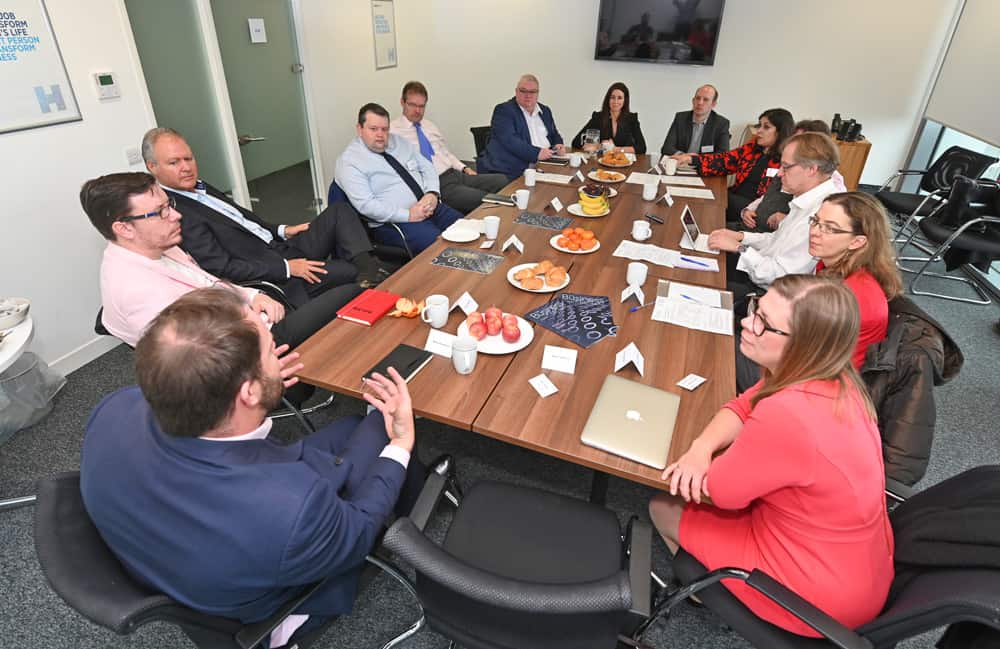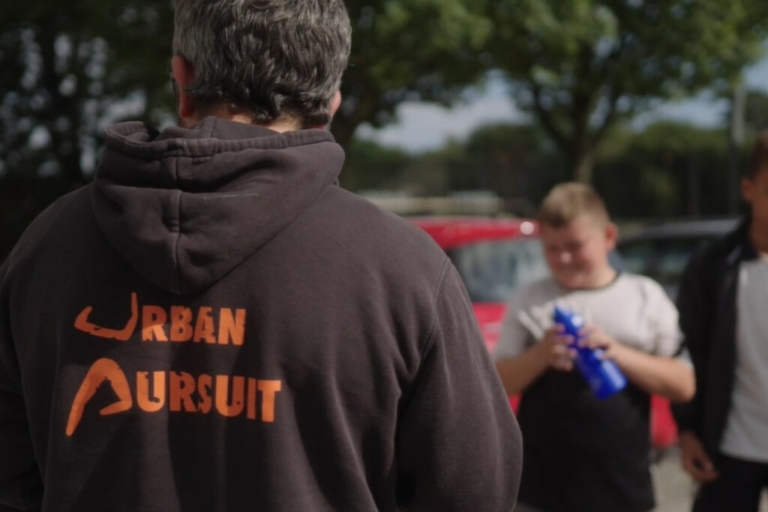2020: Welcome to uncertainty

At this roundtable, business leaders from finalists and sponsors of the Thames Valley Business Magazine Awards shared their views on issues that included when we work, where and how hard. The discussion was hosted by recruitment consultants Hays at the Blade, Reading.
A lively, free-ranging discussion inevitably centred on coronavirus and broadened to an assessment of how business practices might change permanently as a consequence of the global health scare. Topics under the microscope ranged from workplace technology and job interviewing practicalities to flexible working and the burden of stress-fuelled employee burn out.
Coronavirus concerns
The timing of the roundtable in early March came with the world in a rapidly growing state of uncertainty. Brexit didn’t even make it onto the meeting agenda. The Chancellor’s delayed Budget was about to be announced in the shadow of the spread of coronavirus.
Chairing the roundtable, Sarah Stevenson from Hays opened the discussion with a wistful look back to the start of the year. “For my business, January was a brilliant month, and then comes Coronavirus which had had a sudden impact. ” she said.
Post-general election optimism that stability was returning to the UK was short-lived, agreed Gateley Legal’s Christopher Avery.
The panel assessed how coronavirus might have longer-term impacts in areas like increased home working and job losses. Stevenson said: “Hays is very much a face-to-face business. Plus, we have a massive contingent workforce who will be impacted by coronavirus. It’s a very frustrating time.”
Companies are starting to rely even more on technology to get them through thought John Rees from cloud communications provider Content Guru. “A lot of companies are looking at how to extend their cloud computing solutions to include home working,” he said.
“At Content Guru we are pushing customers to our website, for example with webchats, so we can make sure we have the capacity for dealing directly with customers who need help. I think we’ll see a lot of businesses dusting off their contingency plans.”
Kirsti Wilson, from the homelessness prevention charity Launchpad Reading, said: “The virus is a real challenge for the third sector. We tend to pick up the overflow on incidents like this and have to support a large number of vulnerable clients, but don’t receive government funding. Charities like ours will struggle as we don’t have the necessary infrastructure to cope well, like having enough laptops for our employees to work from home.”
Thom Gibbons from Apps in the Sky wondered if coronavirus will be the ‘big issue’ that forces companies to think differently about how they operate and lead to better ways of working. “If we don’t push through changes now then the next time there is something like this, we’ll be back to square one again,” he observed.
Office interior design and build specialist Curve Workplaces has experienced a shift in how businesses are communicating. “Thom is completely right,” said Mark Bradburn. “Businesses need to become more open minded towards technology and how it can help us communicate more effectively. As a relatively new company we are trying to keep our people and clients constantly informed. We’ve never held so many video conference calls with clients. Hopefully, the effect of coronavirus will continue to drive improvements in video conferencing platforms and technology.”
One option during the coronavirus crisis is to ask employees to work from home. But that’s easier said than done for some. As Stevenson noted: “Some companies, including ours, don’t fully know what technology employees have access to at home or whether they are able to work from home effectively. Going forward, we have to change so we have the agility to responded to crises.”
Businesses should take up the mantle and lead the way in finding the means to keep going during the crisis, urged Gibbons: “Governments will act but businesses can lead. It’s up to us to sort out things like home working, so when another incident like coronavirus happens we’re better prepared.”
Challenge to contractors’ status
The debate moved from the global health scare to preparing for more prosaic matters, like the changes due in April 2020 to IR35, HMRC’s off payroll working rules. Any business that relies on contractors needs to be ready. Stevenson said: “ Hays, like most businesses, has seen a significant impact on the demand for contract workers within the private sector. A lot of companies’ projects could be put on hold or delayed if they make blanket determinations not to engage PSCs” she said.
In Cloud Solutions encourages contractors with the specialist skills it needs to consider moving to full-time employment. Bob Atkinson said: “That way, we can reduce the risk of losing good people to our competitors, and gain greater control over our projects.”
Interestingly, the company has recently trebled the size of its UK office, partly because it is preferred their technical development staff work as a community and gain social contact. “It’s better to be office-based if possible, where they can discuss and resolve issues together which isn’t that natural for this type of profile. So, don’t always assume that home working is the answer in all cases,” said Atkinson.
People skills under scrutiny
Home working relies on technology, but having a successful workforce isn’t just about having the right kit. Panelists agreed that getting the right mix of people skills are a challenge. Gibbons broadened the debate: “Are companies preparing people for the workplace and is our education system teaching the necessary skills, like communication and other soft skills?”
Thoughts on younger people and video games were shared. Atkinson spoke out in favour of online gaming. “Oddly, playing video games is the new social platform for chatting with each other, and their online communication skills are great – although they may struggle in live situations, where reading body language is necessary” he said.
“That’s interesting,” Stevenson replied. “We find a lot of negativity around millennials, but many have skills that older workers don’t, such as communicating effectively using virtual communities. We have to adapt by upskilling at both ends of the age spectrum.”
Interview challenges
Personal skills and the use of technology in recruitment interviews are something of a hot potato subject. For example, virtual interviewing. Alan Poole at accountants James Cowper Kreston said: “We do a lot of phone and video interviews, but hiring at a senior level is face-to-face. You don’t get the same impression about someone when you’re not in the room with them. But I’m sure we’ll be doing a lot more virtually in the future.”
Kevin Trafford at R&D tax relief specialists GovGrant added: “It’s about confidence in the candidate. You want to meet face-to-face so you don’t get the appointment wrong.”
Candidates don’t always perform at their best in telephone interviews, and it can be beneficial to brief them on expectations in order to show themselves in the best light, reckoned Laura Callahan from sparkling wine specialists Freixenet Copestick. “Especially if a candidate isn’t confident on the phone. I have experienced candidates doing phone interviews in noisy cafes, and not preparing as they would for a face to face interview.” she said.
However, Stevenson said some of Hays’ clients ask that it does not prepare candidates before their interview. Bradburn thought this was a good idea as you’d want to know as much as possible about their attitude before you employed them.
There’s also a risk of candidates being over-prepared. “Sometimes they have their answers ready when asked questions like ‘say what are your weaknesses’, but if you challenge them to give further examples they struggle because they haven’t really thought about it enough,” noted Wilson.
Apps In The Sky has a novel approach to finding out what candidates are really like. “We tell them to turn up at the pub with a newspaper and we have an informal conversation about the news to find out what are their real values,” said Gibbons.
“That’s a brilliant idea,” thought Jenny Jackson from EB support and research charity DEBRA. “But a phone or video interview is also important if the job roles involving talking to clients these ways.”
How you work
“Some business leaders need to change their mindset on remote working” wondered Callahan.
Stuart Grimwood at Cardinal Clinic thought so. “Work patterns today aren’t just about whether people work from home. It requires a change in management, getting beyond the traditional 9 to 5. It’s far more about task management than time management.”
Virtual working takes companies away from classic management techniques, and line managers benefit from additional support to manage in a remote environment, suggested Callahan. While Wilson highlighted the importance of encouraging neural Neurodiversity in the workforce. “Companies need to embrace differences, for example, employing people with Autistic Spectrum Disorder. A different management style is needed and to recognise that not everyone fits into handy boxes,” she said.
Also, not all employees seek an upward trajectory in their careers. “Some choose not to go up the career ladder. Employers need to offer breadth of opportunity and not just assume everyone wants a linear path,” said Callahan.
And companies need individuals capable of thinking outside the box, suggested Wilson. “There needs to be more focus by companies and schools on soft skills, like creative subjects, as well as STEM subjects.”
Attracting people with different skillsets goes hand-in-hand with creating working environments that suit them, said Bradburn. “Younger generations are a massive influence on this. It’s no coincidence that we are seeing a wider variety of working opportunities in offices, from desks to booths to collaboration tables.”
All the while, you need to maintain a strong company culture, which can pose additional challenges. “We’ve taken on 60% more staff in the last three years and now have a workforce of 350 people,” said Rees. “Our challenge is how you maintain the personal approach as you get bigger. One way we do this is by encouraging UK staff to spend time working in our overseas offices to help create and spread our culture.”
When you work
The panelists agreed that an increase in home working demonstrates a willingness by companies to consider more flexible working arrangements. Atkinson said: “We encourage around 20% of our staff’s time to work flexibly. You can be more creative and think more strategically during these times.”
At Hays, every company seeking recruits is asked to state their position on flexibility. Stevenson said: “We automatically ask employers ‘What flexible working can you allow around this role?’ because it’s what every candidate wants to know.”
A number of panelists said they practiced what they preached by working flexibly. Both Gibbons and Grimwood do a four-day week. “It was interesting to watch my staff get their heads around it,” said Gibbons. “They initially thought it meant I was working from home, which I’m not. People may question if you are serious if you only do a four-day week but it’s about your output.”
Grimwood added: “Senior managers all work four days a week in the office and clinicians often work substantially less, depending on their other commitments. The challenge for us is getting the right people together at the same time, which can be hard to organise if they are on flexible hours.”
Bradburn said: “Flexible working requires management to empower employees to do this effectively.”
The business culture has to be supportive, agreed Jackson. “We have just hired someone on a four-day-a-week contract and I’m confident they will do as much as the other candidates would have achieved in five days. You need to educate your colleagues about the hours you work so they understand. Managers have to trust their teams and teams need to be able to trust their managers not to later go back on the arrangement.”
You also have to be careful that managing remote workers isn’t seen as heavy handed. “As a manager you need to have regular touchpoints and enough checks in place to have confidence that the outputs are being delivered, but not so much that people don’t feel trusted. And you’ve got to be proactive with communication to ensure employees are coping and are feeling supported, as you can be missing the visual clues that they are stressed or struggling,” said Callahan.
Time out
Making sure employees take time out that is due to them not only supports their work/life balance, but it also makes companies more attractive to new employees. Atkinson found the experience of taking a sabbatical from work to look after his young children very enlightening. “It has helped me to understand the stress our employees may feel about taking time off, for example, to attend school activities. At In Cloud Solutions we say you have to take your holiday time – we don’t carry days over at the end of the year,” he said.
Curve Workplaces has recently begun trialing a new initiative where people can request as much holiday as they require. “This is our way of trying to build a culture of empowering our people. We don’t yet know how well it will work, but the results have been positive so far” said Bradburn.
He added: “We let our people know what is expected of them and allow them to manage their workloads to achieve the expected results. They can take as much time off as they feel is right, so long as it’s not disruptive to the business. This process has to be managed properly, for example, around the festive period, or it loses control. We have weekly one-to-ones to monitor work rates. We’re finding that with more pre-planned holidays we can plan the business better.”
Trafford suggested: “Alternatively, you could reward people who don’t take holiday time.”
Stress busting
A significant upshot of how and when companies organise work is the amount of stress it puts employees under. Possibly too much pressure, if growing concerns about workplace mental health issues are anything to go by.
Speaking as someone who has to deal with the fallout, Grimwood said: “We see a lot of burn out, often with patients from the same local employers. Patients from some local employers seem to be presenting more regularly than others. This may be due to company cultures that don’t prioritise mental health wellbeing.”
He quantified the problem: “For every £1 spent supporting mental health in the workplace about £3.30 is spent on dealing with the fallout caused by presenteeism. The answer is to identify problems early and treat them early.”
Technology is failing to deliver solutions, reckoned Poole. “We have the technology to facilitate flexible working but it doesn’t always work out as we might hope. Having everything at our fingertips obviously improves efficiency in many ways, but it can create an always-on culture and we end up working even harder, like answering work emails late into the evening.”
One problem with late night email is relatively easy to overcome, thought Callahan: “Some people work specific hours because it suits their work/balance, for example, taking the time with children at meal times and bedtimes, and catching up on emails later in the evening, but you need to make it clear that you don’t expect others to necessarily respond at the same time as you.”
Third sector frustrations
With two representatives from charities around the table, Stevenson wondered what frustrated them most about their interactions with business. “Companies need to recognise charities are businesses just like them,” said Wilson.
Jackson concurred: “We’re finding companies are moving more into the volunteering side of CSR rather than giving money. Many charities, including DEBRA receive no government funding; the charity sector needs both volunteers and money. DEBRA is very much focused on building mutually beneficial partnerships with companies and providing opportunities such as free team building which raises funds at the same time as providing a positive result for the company in terms of staff motivation.”
“It’s a similar situation for us,” said Wilson. “Companies assume you have projects waiting for their employee volunteers to support. But we don’t always have gardens that need digging or buildings that need repainting. And our staff have to give up their time to manage volunteer work. To be blunt, we are a business and often we prefer to have the money as this will have a direct impact on the support we can offer our clients”.
DEBRA works with companies to help them devleop their CSR policies. “This adds something for the company and shows them we are serious about the issues. And it benefits us because businesses learn more about how they can help us so we both get more out of the relationship,” said Jackson.
Takeaways
Participants left the roundtable with plenty to think about: finding work patterns to cope not only with the coronavirus situation but that are fit for purpose in the longer term. Plus, the idea of employees deciding how much holiday to take, as well as businesses and the third sector looking more closely at mutually beneficial ways of supporting each other.
Participants
Sarah Stevenson: director, chaired the discussion
Mark Bradburn: business development director, Curve Workplaces
Kevin Trafford: business development manager, GovGrant
Kirsti Wilson: head of marketing & fundraising, Launchpad Reading
Jenny Jackson: head of corporate partnerships, DEBRA
Alan Poole: partner, James Cowper Kreston
Laura Callahan: HR consultant, Freixenet Copestick
Thom Gibbons: CEO, Apps In The Sky
Christopher Avery: partner and head of Reading office, Gateley Legal
Bob Atkinson: MD, In Cloud Solutions
John Rees: COO, Content Guru
Stuart Grimwood: commercial director, Cardinal Clinic












